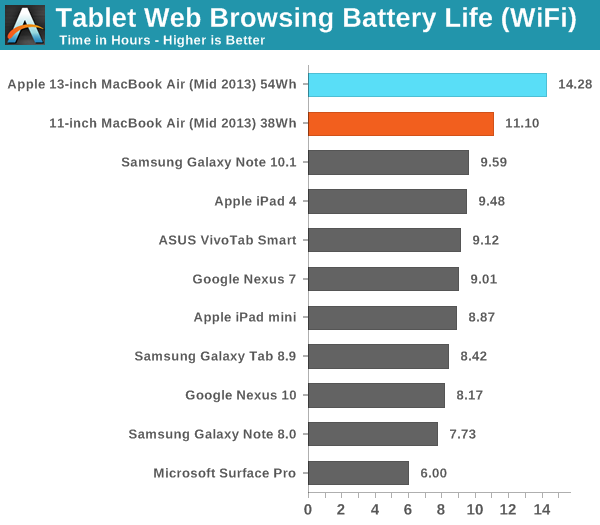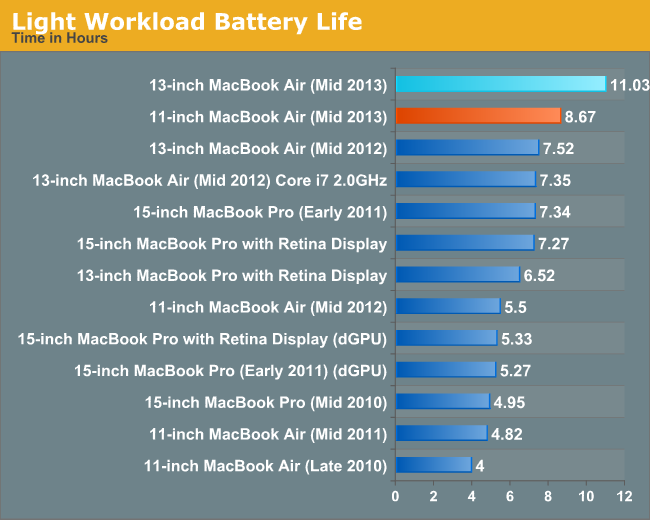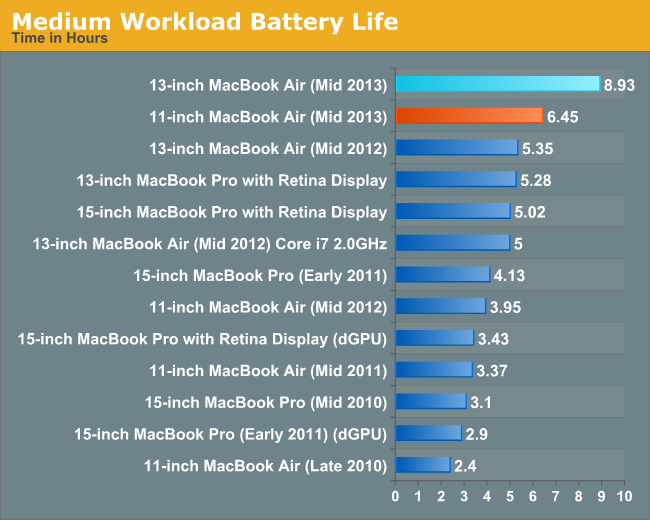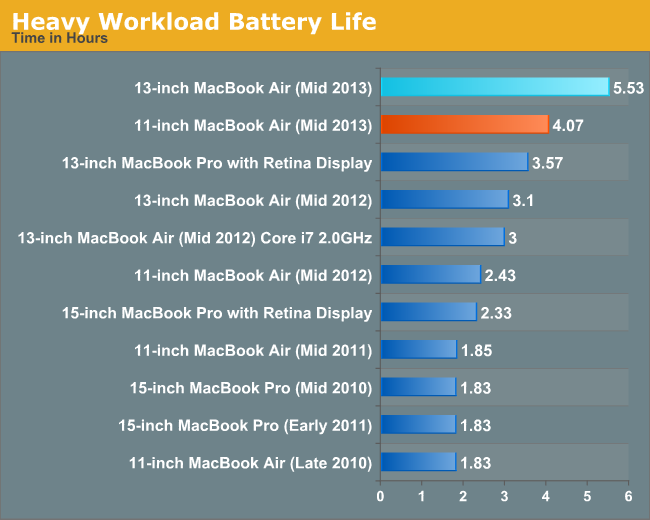The 2013 MacBook Air Review (11-inch)
by Vivek Gowri on August 9, 2013 1:45 AM ESTHonestly, for me, this is by far the most important part of the review. With there being not much in the way of performance upgrades or new features compared to previous generation Airs, the battery life improvement is basically at the heart of what makes the new Air attractive. Obviously, this isn’t exclusive to just Apple—any Haswell ULT Ultrabook with 40-50Wh of battery capacity should get you 8-10 hours of battery life.

But it’s honestly amazing to use a fully fledged notebook that can battle Atom and ARM for battery life. The image from Anand’s 13” Air review showing an estimated 16 hours of battery life was awesome, even if the OS X battery runtime estimate tends to be wildly optimistic in the early part of a battery cycle. The 11” isn’t quite that far, but it still has better battery life than my iPad. Granted, my 3rd-generation iPad now has a year of wear on the battery, but still—it’s longer lasting than my iPad was when new, and it’s also longer lasting than the 4th gen iPad. And not just by a little, it’s a pretty significant step up. That’s a really important corner to turn for the notebook market, double digit battery life without having to resort to an extended or secondary battery like some business notebooks have offered in the past.
As Anand covered in his recent Haswell ULT battery life article, Intel still needs to work on the power efficiency of the Haswell video decode engine, since ARM-based SoCs still hold a sizable advantage there. But other than that caveat, the overall power consumption of Haswell is an absolute game changer. I’ve never even thought to take the power cord with me anywhere in the month that I’ve had it. Want to take the Air for a weekend away and not plug it in once, iPad style? Depending on how much of your usage can get pushed to a smartphone, that’s a legitimate and realistic possibility.
The 11” Air, by virtue of its smaller display, is slightly more efficient than its larger sibling, but the 42% advantage in battery capacity pushes the 13” Air’s battery life into the insane range. Being able to rely on nearly 10 hours of battery life or more in most normal use cases is just ridiculous. The 11” is a bit less phenomenal, but anything that can claim better battery life than the iPad, even with a smaller battery, is doing just fine.



At 8.5 hours dead on in our usual Mac light browsing test, the 2013 11” is three hours ahead of the 2012. That’s 54.5%. It’s nuts, the end. That advantage holds basically through the rest of our more strenuous battery life tests. The previous 11” really had an issue with battery life—the real-world 5 hours of runtime just didn’t cut it given the sacrifices made for mobility; it made much more sense to get a 13”. Now, with 8+ hours of runtime, it’s easier to ignore. The jump from 5.5 to 7.5 hours of battery life makes a pretty significant difference in how the system gets used, but I’m less sure about the difference between 8.5 and 11. Once you’re already in that 8-10 hour battery life range, adding two or three hours on top of that is a lot less valuable than it would be in a situation where you’re adding that amount to get to that range. This isn’t to say that more battery life isn’t always better, just that at some point it becomes something that is nice to have rather than something that changes the essence of the system, almost like the difference between an i5 and an i7 CPU.










139 Comments
View All Comments
darwinosx - Friday, August 9, 2013 - link
Haven't gotten any faster? Did you read how fast the ssd is?antonio22m - Friday, August 16, 2013 - link
Air is perfect and the best "second computer" that you can wish for.Take a look at this comparison at http://www.squidoo.com/apple-macbook-air-133 and You will see comparison to the another Apple laptops.Anyone considering purchasing this laptop needs to see the information in this chart.
BryanDobbins - Saturday, August 17, 2013 - link
my classmate's half-sister makes $88 every hour on the computer. She has been without a job for six months but last month her pay was $21529 just working on the computer for a few hours. Read more on this site... http://xurl.es/mcdufxTRICKYxx - Friday, August 9, 2013 - link
Damn, that is awesome battery life. It almost makes me want to sell my 2012 MBP... But, its the heavy workloads that make my battery tank. For the most part, its the discrete GPU's fault.Could you guys do a light gaming test? How long will Minecraft last for these guys?
xTRICKYxx - Friday, August 9, 2013 - link
Using HD 4000 graphics, I can get around 2.5 hours of gaming. It would be pretty cool to have a more portable gaming experience.solipsism - Friday, August 9, 2013 - link
I would wait for the 2013 MBPs to drop before making a decision. I assume going to the Air wouldn't be a great move if you like the performance, ports, storage, and display the MBP offers that the Air cannot.I suspect they will arrive by October with TB2 being a holdup. Same for the new Mac Pro. I also assume Apple will have a 4K (or higher) replacement to their 27" display, which may be 30.5" if other vendors are anything to go by.
name99 - Saturday, August 10, 2013 - link
TB2 may be the holdup.But what is the status of 3x3:3 802.11ac chips? Obviously we have ones that are good enough for a base station, but maybe the lower power ones that you'd want in a laptop aren't available yet, and Apple doesn't want to ship with 2x2:2. (Though I assume they will if necessary, that they have that as a plan B if the 3x3:3 ships delay too long.)
It's worth noting that the other obvious MIA is the new Mac Mini. That COULD ship with a power-hungry 802.11ac chip, but would be embarrassing for Apple because they have made a big deal in the past about how low-power it is.
The Mac Mini suggests that the delay is not in any way screen related (eg waiting for a cheaper retina screen, so the whole line is rMBP, or waiting for a lower power retina screen.)
It seems likely, IMHO, that both MBPs and Minis are being delayed by a part, not just for the sake of scheduling, because when they do get released they're going to make Apple's revenues even more volatile. If they could have been released last quarter or this quarter, they would have upped revenues (which were down because of no new iOS devices). Shipping in Fall means they're going to pump up the already high revenues from iPhone 5x and iPad new, and make Apple look even more manic depressive, going from a slow Q1 to a blowout Q3 and Q4.
vFunct - Friday, August 9, 2013 - link
These Airs really do need LTE connectivity built in.Scannall - Friday, August 9, 2013 - link
I agree. I'm surprised it isn't an option yet.name99 - Saturday, August 10, 2013 - link
The general consensus on this point is that while iOS was built from the ground up to "monitor" networking and carefully use the cellular network only to the bare minimum (so delaying non-critical network ops until they can maybe go out over WiFi) OSX is a more traditional model of saying whatever it wants (in a more chatty fashion) whenever it wants.Users of the LTE might be upset that their data usage vastly exceeds what they expected, given iOS experience.
Reading between the lines of the work that has been done for Mavericks (eg all the work bunching stuff which is nominally to save power) it is possible, even likely, that they are gradually moving the iOS code into OSX, and when that is ready the LTE models will ship.
(It's also possible that there is a kind of hardball negotiation going on here between Apple and the telcos. Obviously Apple, as advocate of its customers, would like the telcos to offer plans along the lines of "2GB of data, used however you damn well like, across whatever devices you damn well like". The telcos would obviously prefer their various current models (which all involve paying a hell of a high monthly fee for separate devices, regardless of exactly how that extra per device fee is calculated or named). But whichever one breaks first has the chance to pull an ATT and sweep up a huge pool of the most desirable customers. When that telco [Sprint or T-Mobile most likely] caves is when Apple will ship with LTE?)